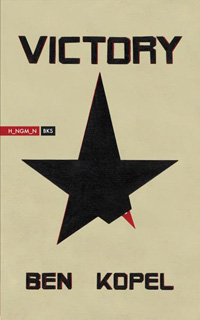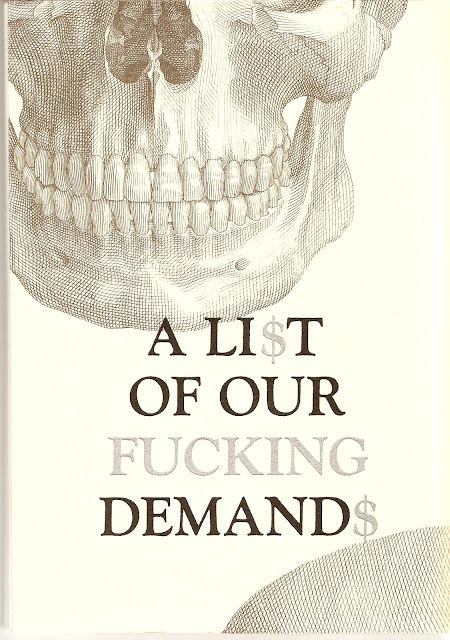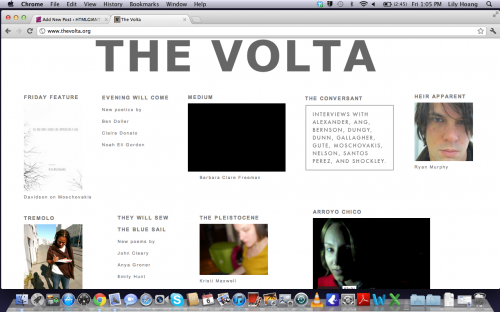Contributor Party
Erik Stinson

Corporations are the new angels of America, letting go in aluminum bathroom stalls, those mirrors of our spiritual disguise. Bagel holes were the voids in our lives, filled by pop-up ads, punctured by five inch heels propping up the advertising interns “doing” Soho for lunch. Arugula salad. In my New York office painted eggshell white and Sharpie marked with cartoon allusions, amidst the European glossy mags on which my foggy semblance prevailed, I could feel the pulse of my enormous member in my palm. It felt like Miami during high noon, the relapse of a USB drive containing a .pdf novel. The domestic beer in front of me was eventually outsourced by the neopolitics of ironic ingestion, sprayed outward into R. Mutt’s urinal moments after my pastrami sandwich made by the last Zionists of West Village. The CEO listened to a calm ocean with his Sony walkman. I got promoted.
Web Purchase Is The Purest Narrative

On my adventures in corporate American marketing, I’ve come across a literary form that I believe is the purest, most perfect expression of human desire, passion, tragedy, longing, comedy, and love. In modern user experience design and eCommerce, this form is known as “Call To Action.” In its most common form it’s a digital image of button, with copy. It appears at the end of a poem about a product. When you see the button, you understand everything that there is to understand about your relationship to capital markets, to objects, and to human labor. Shorter than the novel, more emotive than the poem, and far more popular than the TV serial, the CTA is certainly in a golden age.
Announcing Issue 7 of Requited
Requited is an online journal that I help edit. I’m pleased to announce that the seventh issue is now up. In the section that is my province (essays) you will find:
- Jeremy M. Davies on reading Gilbert Sorrentino;
- William Bowers on watching Spider-Man;
- & Curtis White on rethinking Freud and childhood sexuality.
There is also a review, by Daniel Green, of the book We Wanted to Be Writers: Life, Love and Literature at the Iowa Writer’s Workshop, edited by Eric Olsen and Glen Schaeffer (Skyhorse Publishing, 2011).
In the rest of the issue you will find:
- fiction by Maya Sonenberg, Hilary Plum, Eugenio Volpe, & Adam Moorad;
- poetry by Neal From, Christine Hamm, j/j hastain, Stephen Daniel Lewis, Amy Pence, Andrea Rexilius, Lina Ramona Vitkauskas, & Daniel Godston;
- excerpts from Calamari Press’s Ark Codex ±0;
- a performance text by Michael J Pagan;
- visual art by Mark Aguhar;
- a video by Dara Greenwald;
- & a comic by Dylan Williams.
Requited is edited by Amanda Marbais (fiction), H.V. Crammond (poetry), Ira S. Murfin (performance texts), Fereshteh Toosi (visual art and videos), and myself (essays and reviews). We publish two issues per year. Our complete archive is accessible here, and our submission guidelines are here. If you have any further questions or comments about the journal, I would be happy to receive them.
Enjoy Issue 7!
A Li$t of Our Fucking Demand$
The Feeling is Mutual: A Li$t of Our Fucking Demand$ is an anthology edited by Sara Wintz, designed by Michael Cross and Stephen Novotny. All proceeds from the purchase of the anthology go towards supporting Small Press Traffic, the esteemed Bay Area nonprofit organization.
Five Works of Criticism You Should Consider Reading
“Criticism is itself an art.” – Oscar Wilde
A couple of months ago I shared a list of “Five Works of Theory You Should Consider Reading,” at least two fifths of which could also easily be described as criticism (Glas viz Genet, and Crack Wars viz Flaubert, for sure). Boundaries, of course, are porous.
As if it’s not obvious, I love reading theory and criticism. Two forthcoming books I can’t wait to read are Kate Zambreno’s Heroines (Semiotext(e) / Active Agents) and Sianne Ngai’s Our Aesthetic Categories: Zany, Cute, Interesting
(Harvard University Press), both due out in October. Criticism? Theory? Poetry, fiction, autobiography? If their previous work is any indication, the only label worth applying will be “badass.”
Similar to my theory choices, I could’ve picked a hundred dozen or more, so limiting myself to five seems like a good, if difficult, idea. And, like last time, I cheated and added a bunch of alternative choices within the five major choices. Ah the joy of making up the rules as you go.
For the most part, I chose the books I chose because I like them for the way they play with genre, the way they enact formal deterritorialization, the way they make the criticism itself a work of art, or as Wilde puts it in the essay I quoted from above, “It treats the work of art simply as a starting-point for a new creation.”
The Importance of Being Ben Kopel
 Victory
Victory
by Ben Kopel
H_NGM_N BKS, January 2012
112 pages / $14.95 Buy from H_NGM_N BKS
Ben Kopel is stupid. Ben Kopel deliberately refuses to believe that people may not always be inherently good at heart, despite the steady influx of evidence piling up at his feet. Instead, he declares Victory, his debut collection from H_NGM_N BKS, a book for which I have personally been waiting a very long time.
I first heard of Kopel while I was pursuing an MFA at Louisiana State, where he was an undergrad. He was a nice kid, and after hearing just a half dozen of his poems, I knew he would shape up into an excellent writer. There was no significant fault to find, so I hated him. When he got into the writing program at Iowa, we lost touch. I thought for sure that they would knock the joy right out of him, that he would turn into a bastard. Imagine my surprise when he finished his MFA and then went over to Amherst for a second one. Kopel not only survived Iowa, he found it an insufficient concluding point for his education. So finally arrived is the singular product of an unusual path for this son of the swampland, equipped with James Tate’s sense of imagery, Dara Wier’s gift for cadences, and a healthy confusion about the business of poetry born out of the midwest’s most critically acclaimed bloodbath.
July 9th, 2012 / 12:00 pm
contemp late
No story can be fully described, because the description would have to duplicate the story, and this is an impossibility. A story is only a story, not an abstraction, and it is the ultimate source of all writing; but since “the ultimate source of all writing” is a description of the inexpressible, which leads to making unreal distinctions, in order to speak of it we’ll call it “a story.” Once we single stories out and treat them as distinct from other stories, we find the idea of their opposite. Readable, for example, once distinguished, suggests its opposite, unreadable. A good story, when we think about it, is naturally opposed to a bad one. In fact, all distinctions naturally appear as opposites that get their meaning from each other. “Too abstract” and “like a teenage diary,” “holy fuck, another zombie,” “So what u cut n pasted your banal emails,” “didactic and obvious,” “talking animals doesn’t mean you’re a magical realist” “over earnest and shitty”-all derive their meanings from their opposites. Therefore, the thoughtful writer accepts how it is as how it is.
In seeking to grasp what it is, he does not devote himself to making distinctions that are then mistaken to be separate existences. He does not point out differences, he writes. A story exists, and he sees that nothing is gained by representing what exists by a description, a lesser, diluted existence. If someone interprets the story, he does not trust that interpretation as being equal to the actual story. If no distinctions of superiority and inferiority prevail among indie and mainstream, novelists and flash fiction authors, old fuckers and those annoying 20 year old blogger types, they will devote their attention to the stories rather than to rivaling one another. If no special value is placed on a writer’s awards, other writers will not covet them. If one writer doesn’t appear to arouse envy, other writers will remain satisfied with things as they are. Since this is so, the wise editor doesn’t choose to blackball genres of writing but satisfies the writers’ inner needs. He does not write rejection or acceptance letters. Stories contain nothing over and above the stories themselves. In a story, all nature originates, all conflicts are settled, all disturbances are quieted. No matter how many stories are written or read, more come. To look elsewhere is foolish.
“Jobs” you get “paid” for
It strikes me as funny that some commenters responded to my post below – letting people know about an opportunity to edit for the Volta – by questioning what a “job” is.
It strikes me as funny because most of call ourselves “writers”, but we’re not paid for it.
Many of us call ourselves “editors”, but we’re not paid for that either.
For the past few years, I’ve served as an associate editor for Starcherone Books, editor for Tarpaulin Sky, and prose editor for Puerto del Sol. I’m currently guest editing Fairy Tale Review. Blake and I co-edited an anthology. I’m editing an anthology right now with Joshua Marie Wilkenson.
All of it: unpaid.
Need a fucking job? Well, here’s one for you.
[Note: this is from Joshua Marie Wilkinson, so insert his name in instances of first person.]
***The Volta Seeks a Managing Editor***
Dear friends, poets, editors:
I started The Volta in January 2012 with poet Sara Renee Marshall to feature poetics essays, book reviews and author questionnaires, videos and poemfilms, interviews, audio conversations, and even poems.
Three of our columns are updated weekly, on fridays (Friday Feature, Medium, & Arroyo Chico), and the others have new content on the first of each month.
So far we’ve featured works by known and emerging writers (e.g., C.D. Wright, Rae Armantrout, Harmony Holiday, Joshua Clover, Farid Matuk, Juliana Spahr, Renee Gladman, and literally dozens of others: complete list is here).
We have new work coming out from Bernadette Mayer, Maggie Nelson & Brian Blanchfield, Douglas Kearney, Amy King, Rob Halpern, Lisa Robertson, Ammiel Alcalay, Tyrone Williams, Kate Bernheimer, Zach Schomburg, & dozens of others.






